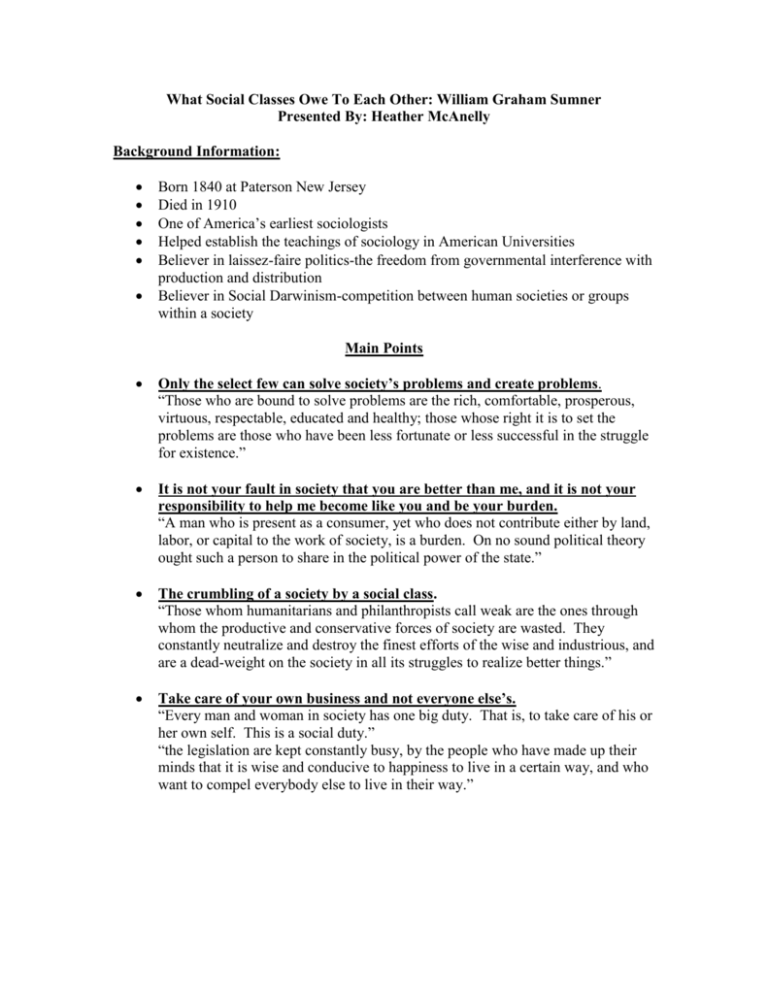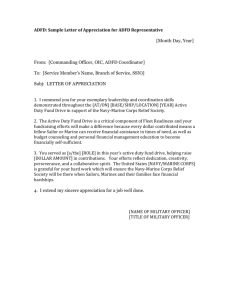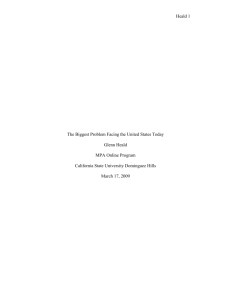What Social Classes Owe To Each Other: William Graham Sumner
advertisement

What Social Classes Owe To Each Other: William Graham Sumner Presented By: Heather McAnelly Background Information: Born 1840 at Paterson New Jersey Died in 1910 One of America’s earliest sociologists Helped establish the teachings of sociology in American Universities Believer in laissez-faire politics-the freedom from governmental interference with production and distribution Believer in Social Darwinism-competition between human societies or groups within a society Main Points Only the select few can solve society’s problems and create problems. “Those who are bound to solve problems are the rich, comfortable, prosperous, virtuous, respectable, educated and healthy; those whose right it is to set the problems are those who have been less fortunate or less successful in the struggle for existence.” It is not your fault in society that you are better than me, and it is not your responsibility to help me become like you and be your burden. “A man who is present as a consumer, yet who does not contribute either by land, labor, or capital to the work of society, is a burden. On no sound political theory ought such a person to share in the political power of the state.” The crumbling of a society by a social class. “Those whom humanitarians and philanthropists call weak are the ones through whom the productive and conservative forces of society are wasted. They constantly neutralize and destroy the finest efforts of the wise and industrious, and are a dead-weight on the society in all its struggles to realize better things.” Take care of your own business and not everyone else’s. “Every man and woman in society has one big duty. That is, to take care of his or her own self. This is a social duty.” “the legislation are kept constantly busy, by the people who have made up their minds that it is wise and conducive to happiness to live in a certain way, and who want to compel everybody else to live in their way.” The government gets its money from you to help reform society. It gives it to me to help make me like you. “the right to claim and the duty to give one man’s efforts for another man’s satisfaction. We shall find that every effort to realize equality necessitates a sacrifice of liberty.” “prejudice that a man who gives a dollar to a beggar is generous and kind-hearted, but that a man who refuses the beggar and puts the dollar in a savings-bank is stingy and mean. The former is putting the capital where it is very sure to be wasted, and where it will be a kind of seed for a long succession of future dollars, which must be wasted to ward off a greater strain of the sympathies than would have been occasioned by a refusal in the first place. Inasmuch as the dollar might have been turned into capital and given to a laborer who, while earning it, would have reproduced it, it must be regarded as taken from the latter.” I have as much right as you to have as much success as you do, but I expect to have it handed to me without the sacrifices that you have made. “We each owe it to the other to guarantee rights. Rights do not pertain to results, but only to chances. They pertain to the conditions of the struggle for existence, not to any of the results of it; to the pursuit of happiness, not to the possession of happiness.” “The men who have not done their duty in this world never can be equal to those who have done their duty more or less well.” Questions to Consider Do you think this is still an issue for today’s society and if so, what? Do you think the government should provide those with less than you more? When should services be stopped?









![(NPD-60) []](http://s3.studylib.net/store/data/007320126_1-47edb89d349f9ff8a65b0041b44e01a8-300x300.png)

